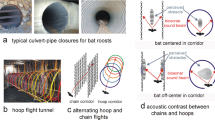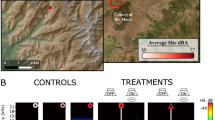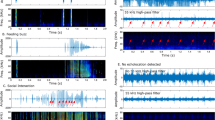Abstract
ON windless evenings fog commonly forms in dense, sharply defined patches, especially in sheltered bays of ponds. As the evening progresses and the temperature falls, these patches may grow and coalesce, advancing over the pond but maintaining a sharp front at which visibility changes profoundly within a few metres. In such conditions insectivorous bats hunting over the water have been observed to turn back at the fog front as if at a solid wall, even though their hunting area may become severely restricted. This behaviour suggests that fog may have a direct effect on echo location.
This is a preview of subscription content, access via your institution
Access options
Subscribe to this journal
Receive 51 print issues and online access
$199.00 per year
only $3.90 per issue
Buy this article
- Purchase on Springer Link
- Instant access to full article PDF
Prices may be subject to local taxes which are calculated during checkout
Similar content being viewed by others
References
Houghton, H. G., and Radford, W. H., Pap. Phys. Ocean. Meteorol. MIT, 6, 5 (1938).
George, J. J., in Compendium of Meteorology (edit. by Malone, T. F.) (Boston, 1951).
Rayleigh, Lord, The Theory of Sound (London, 1896).
Webster, F. A., Animal Sonar Systems (edit. by Busnel, R.-G.), 673 (Jouy-en-Josas, 1967).
Author information
Authors and Affiliations
Rights and permissions
About this article
Cite this article
PYE, J. Bats and Fog. Nature 229, 572–574 (1971). https://doi.org/10.1038/229572b0
Received:
Revised:
Issue Date:
DOI: https://doi.org/10.1038/229572b0
Comments
By submitting a comment you agree to abide by our Terms and Community Guidelines. If you find something abusive or that does not comply with our terms or guidelines please flag it as inappropriate.



